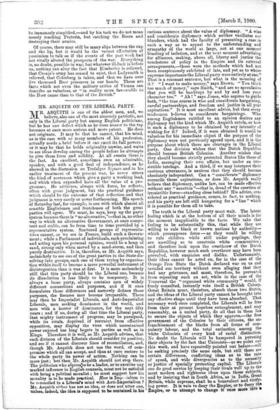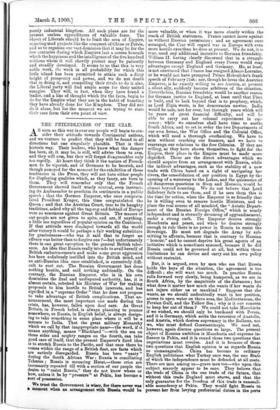MR. ASQUITH ON THE LIBERAL PARTY.
MR. ASQUITH is one of the ablest men, and, we believe, also one of the most sincerely patriotic, not only in the Liberal party but among English politicians, but he has one defect which as he rises nearer to the top becomes at once more serious and more patent. He does not originate. It may be that he cannot, that his mind, as is the case with so many members of his profession, actually needs a brief before it can exert its full powers ; or it may be that he holds originality unwise, and waits to see ideas develop among the people before he attempts to give them form and solidity. At all events there is the fact. An excellent, sometimes even an admirable, speaker, and with a good deal of independence, as he showed in the discussion on Trafalgar Square and in his earlier treatment of the present war, he never utters the kind of sentences which give a party a working lead, and which when expanded have all the value of a pro- gramme. He criticises, always with force, he reflects, often with great judgment, but the practical guidance which should be the outcome of that reflection and that judgment is very rarely or never forthcoming. His speech of Saturday last, for example, is one with which almost all sensible Englishmen and Scotchinen of both the great parties will agree. We must, he says, keep up the party system because there is "no alternative,"—that is, no other way in which an alternative Government, at once compe- tent and stable, can be from time to time provided by a representative system. Scattered groups of representa- tives cannot, as we see in France, build such a Govern- ment; while a Parliament of individuals, each proclaiming and acting upon his personal opinion, would be a heap of sand, strong only when moved by a sand-storm, and then purely destructive. It is, therefore, as Mr. Asquith says, melancholy to see one of the great parties in the State dis- solving into groups, each one of them trying by organisa- tion within itself to become a more powerful instrument of disintegration than it was at first. It is more melancholy still that this party should be the Liberal one, because its dissolution is less likely to be temporary. It is always a loose party, always contains men of widely different connections and purposes, and if it once formulates those differences and narrowly defines those purposes, the fissures may become irreparable. There may then be Imperialist Liberals, and Anti-Imperialist Liberals, men seeking dominance in the world, and men with a, horror of dominance, for the next fifty years ; and if 'so, during all that time the Liberal party, that mighty instrument of progress, may be paralysed, while its rivals, deprived of restraint from effective opposition, may display the vices which unrestrained power enjoyed too long begets in parties as well as in Kings. Therefore it is well, as Mr. Asquith advises, that each division of the Liberals should consider its position, and see if it cannot discover lines of reconciliation, and, though Mr. Asquith does not use the word, of com- promise which all can accept, and thus at once restore to the whole party its power of action. Nothing can be more just ; but then Mr. Asquith should not stop there. The politician who aipireesto be a leader, or to exercise any marked influence in English counsels, must not be satisfied with being a political moralist ; he must suggest how his morality is to be made practical. How is Imp, ialistu to be reconciled in a Liberal's mind with Anti-Imperialism ? Mr. Asquith either has not an idea, or does not utter one, unless, indeed, the idea is supposed to be contained in his curious sentence about the value of diplomacy. "A wise and considerate diplomacy which neither vacillates nor blunders, which had the faculty of presenting a case in such a way as to appeal to the understanding and sympathy of the world at large, not at one moment boasting of isolation, and at the next moment advertising for alliances, making, above all, liberty and justice the touchstone of policy in the Empire and its external arrangements,—those were the methods which had not been conspicuously exhibited of late, and yet as to whose supreme importance the Liberal party were entirely at one." That is a resonant sentence, but what is the meaning of it ? "I want to make money," says Brown. "You think too much of money," says Smith, "and are so speculative that you will be bankrupt by and by and lose your character too." " Ah " says Jones, who aspires to guide both, "the true course is wise and considerate bargaining, careful partnerships, and freedom and justice in all your aspirations." It is most excellent advice, but then every tradesman believes in considerate bargainings. Who among Englishmen entitled to an opinion desires any diplomacy but the kind which Mr. Asquith extols, or bow is such a diplomacy to be obtained by any intensity of wishing for it ? Indeed, if it were obtained it would be valueless for his immediate object if the purpose of the diplomacy were not previously agreed upon, and it is the purpose about which there are cleavages in the Liberal party. One division wishes that the Dutch Republics should become British Colonies. Another wishes that they should become strictly protected States like those of India, managing their own affairs, but under an irre- sistible tutelage. And a third, if we may interpret their cautious utterances, is anxious that they should become absolutely independent. Can a " considerate " diplomacy reconcile those aspirations, or does Mr. Asquith really believe that diplomacy, unlike law, can be made effective without any "sanction "—that is, dread of the exertion of irresistible force—standing close behind? His advice, con- sidered as practical guidance, comes, in fact, to nothing, and his party are left still hungering for a "line" which it is possible for them all to take.
The truth is the Liberal party must wait. The latent feeling which is at the bottom of all their minds is for the moment inapplicable to the facts. We take that feeling to be substantially this, that while they are willing to rule black or brown nations by authority— which presupposes force — as they would be willing to rule children while still under pupilage, they are unwilling so to constrain white communities ; and therefore look" upon the overthrow of the Dutch Republics, however much such overthrow may have been provol7ed, with suspicion and dislike. Unfortunately, their ideas cannot be acted on, for in the case of the Orange Free State the Dutch declared war on us and invaded our territory without even alleging that they had any grievance, and must, therefore, be prevented from repeating such an act, while in the case of the Transvaal the "organised white community" would, if freely consulted, instantly vote itself a British Colony. Great Britain must, therefore, absorb those two States, and the ideas of the Liberal party cannot be brought into any effective shape until they have been absorbed. That necessary work once completed, the Liberals will be free from their at present hopeless entanglement, and may reasonably, as a united party, do all that in them lies to secure the objects of which they approve,—the free government of the Colonies by their citizens, the en- franchisement of the blacks from all forms of com- pulsory labour, aud the total extinction among the white Colonists of every kind of racial distinction. No doubt the Liberals will be hampered in pursuing their objects by the fact that Unionists—as we point out this week, and have repeatedly pointed out before—will be seeking precisely the same ends, but still there are certain differences, conflicting ideas as to the rate of speed, and wide divergencies as to the necessity or justice of specially protecting capitaL The Liberals can do good service by keeping their rivals well up to the most modem and righteous ideas upon those subjects, and by insisting that in South Africa, as in India, Great Britain, while supreme, shall be a benevolent and vivify- ing power. It is vain to deny the Empire, or to decry the Empire, or to attempt to change it once more into purely industrial kingdom. All such plans are for the present useless expenditures of valuable force. The object of Liberals should be to limit the area of Empire, rejecting mad projects like the conquest of China or Persia, and so to organise our vast dominion that it may be for the few centuries during which Empires last a screen beneath which the happiness and the intelligence of the five hundred millions whom it will shortly protect may be patiently and steadily developed. It seems to us that this is very noble work, the work in all probability for which this little island has been permitted to attain such a, dizzy height of prosperity and power, and we do not doubt that in doing it, and compelling their rivals to do it also, the Liberal party will find ample scope for their united energies. They will, in fact, when they have found a leader, and a line of thought which fits the facts, begin to do for the Empire what they are in the habit of boasting they have already done for the Kingdom. They did not do it alone, but for the moment we are trying to state their case from their own point of view.







































 Previous page
Previous page